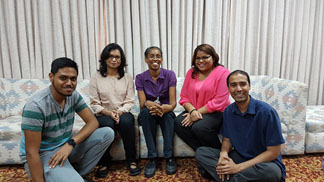By Karen Abrams, MBA Co-Founder, STEMGuyana
The University of the West Indies (UWI) Department of Electrical and Computer Science Team has an idea for STEM education in Trinidad and Tobago and it could potentially benefit the entire Caribbean.
Dr Cathy-Ann Radix is a professor in the UWI, Department of Electrical and Computer Engineering. Her research project focus includes Embedded Systems, Human-Computer Interaction, Robotics and Visual Media Processing. She was working to roll-out a robotics programme in Trinidad’s schools when government funding constraints caused a halt to the project. This was just after teachers were trained in using robot technology to assist them in delivering their lesson plans, but just before the robot kits were purchased for all schools.
Radix realized that her team needed to come up with an independent and sustainable solution if the STEM initiative was going to be effective. Her sustainable solution included the big idea to design and manufacture a robot kit for school children that would cost no more than a textbook, that was open source, robust and manufactured locally so that replacement parts, upgrades and add-ons would be affordable, available and relatively easy to create by students and teachers.

Jeevan Persad is currently an Engineering Technician at UWI but was working on his Master of Science Degree in Computer Science and in need of a research topic when he reached out to Radix for ideas. Their collaboration became an entrepreneurial venture to design and manufacture ‘Gadget Box,’ a robot kit that school children could afford and would be used in the classroom as a teaching aid to push STEM education using exciting technology tools.
“Many of our students are haptic learners and quite often they find themselves at the back of the classroom and under-achieving academically because of the lack of tools to engage and teach them the way they learn best, said Persad. “Gadget box will help to close that gap.”
The kit uses open source designs for both hardware and software, specifically using the .NET Microsoft Gadgeteer platform. The goal is to create a product which would allow teachers, students or organizations to build their own sensors, customized to their lesson plans or projects. The kit is also designed to encourage students to use technology to solve real world problems.
The team intends to design and manufacture ‘Gadget Box’ in the Caribbean for the target price of around US$50 which must be contrasted with the popular Lego Mindstorm kit which retails for around US$375. Gadget box will be manufactured with help from Metal Industries Company (MIC), a government funded teaching and metals manufacturing entity in Trinidad, when prototype and testing phases have been completed. The team has also engaged discussions with international agencies about the possibility of expanding their market to school children in other huge developing nations.

While ‘Gadget Box’ is an independent entrepreneurial venture, the government of Trinidad has been extremely supportive of the initiative and it is recognized by all stakeholders that the success of the programme will require teacher input, testing during the pilot phase, teacher peer communities for sharing of ideas and lesson plans and teacher and student feedback to determine effectiveness of the programme and ideas that will be used to upgrade and improve the kit.
Radix explained that their effort is part of a new ecosystem and her role includes a strategic analysis of the STEM environment in Trinidad, the setting up of systems that will aid in the expansion and sales throughout the Caribbean region and the world, building out the entrepreneurial infrastructure necessary for hers and other STEM products to thrive and working to achieve the target date of December 2017 for rollout.
The team has already invested more than TT$100,000 of their own funds in the venture and are currently crowdfunding US$50,000 on indigogo.com, which will be used to complete the prototype phase of development.
Thus far the feedback and support have been universally encouraging. STEMGuyana looks forward to the roll-out of this product and will be interested in the procurement of kits for testing in our own programme. While the Caribbean is late to the STEM game, we are certainly neither short on ideas nor talent. ‘Gadget Box’ should serve as an inspiration to technology stakeholders throughout the Caribbean as an innovative idea, created by Caribbean talent, used to educate, empower and inspire our youth and to solve problems in our communities and around the world.




